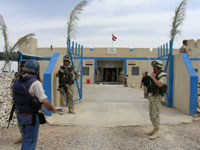Iran reopens border crossing points with Iraq

Five border crossing points with Iraq closed by Iran to protest the detention of its officials by the U.S. troops were re-opened by Tehran Monday.
The border points were closed to protest the U.S. detention of an Iranian official who the military said was a member of the paramilitary Quds Force, a branch of the Iranian Revolutionary Guards that is accused of provide arms and training to Shiite extremists.
Ratcheting up the rhetoric, top U.S. commander Gen. David Petraeus claimed this weekend that the Iranian ambassador to Baghdad, Hassan Kazemi Qomi, was a member of the Quds Force.
"The Quds Force controls the policy for Iraq; there should be no confusion about that either," Petraeus told CNN and other reporters during a trip to a military base on the Iranian border. "The ambassador is a Quds Force member. Now he has diplomatic immunity and therefore he is obviously not subject and he is acting as a diplomat."
Petraeus did not provide details on how he knew Qomi, who has held talks in Baghdad with U.S. Ambassador Ryan C. Crocker, belonged to the Quds Force, and the Iranian Foreign Ministry rejected the allegations.
"These are not new comments. Similar accusations were raised, formerly. It is baseless and not right," ministry spokesman Mohammad Ali Hosseini told reporters in Tehran.
The Iraqis have found themselves caught between two allies as they struggle to balance the interests of their main sponsor the U.S. military and Iran, a major regional ally. Iran holds considerable sway in Iraq as both countries have majority Shiite populations and many members of Iraqi Prime Minister Nouri al-Maliki's ruling Shiite bloc have close ties with Tehran.
The border points, which had been shut down on Sept. 24, were reopened after a Kurdish delegation traveled to Iran to complain the region should not be punished for something the Americans did. Iraqi and Iranian authorities have claimed that the detained Iranian, Mahmoud Farhadi, was in Iraq on official business and demanded his release.
A spokesman for the Kurdish regional government in northern Iraq, Jamal Abdullah, expressed hope the resumed flow of traffic and goods would help reduce price hikes that had plagued the region since the closures.
The reopening is in the "economical interests of both countries," Abdullah said, adding that Tehran and Baghdad share the responsibility to "prevent gunmen from having access to either side of border."
The frictions come at a time when Iraqi-U.S. relations also are strained over the Sept. 16 killing of Iraqi civilians allegedly by security guards from Blackwater USA, which protects American diplomats in Iraq.
An official Iraqi investigation into the Blackwater shootings has raised the number of Iraqis killed to 17 - six more than previously thought - and concluded the gunfirewas not warranted and that those involved should face trial.
Government spokesman, Ali al-Dabbagh, announced Sunday that the Iraqi investigative committee had completed its work and found that 17 were killed and 23 wounded.
The committee asserted the shootings, in which also seven cars were burnt or damaged, amounted to a deliberate murder and recommended those involved be held legally accountable.
Its final results showed that the convoy from the Moyock, North Carolina-based security company did not come under direct or indirect fire at western Baghdad's Nisoor Square. "It was not hit even by a stone," al-Dabbagh said in a statement.
A U.S.-Iraqi commission also met for the first time on Sunday to review American security operations after the Sept. 16 shootings.
The panel is one of at least three investigations on the incident. Blackwater contends its employees came under fire first. The incident has caused outrage among Iraqis and stepped up calls for the rules governing those protecting American diplomats to be overhauled.
Al-Dabbagh said the Iraqi Cabinet would weigh the Iraqi findings with those of the joint commission "and subsequently adopt the legal procedures to hold this company accountable."
The Sept. 16 incident was one of at least six involving deaths allegedly caused by Blackwater that authorities here have brought to the attention of the Americans.
Separately, U.S. troops killed five and detained three suspected rogue Shiite militants early Monday in eastern Baghdad after they came under attack during an operation targeting a cell involved in kidnappings and attacks with armor-piercing roadside bombs known as explosively formed penetrators, or EFPs, the military said.
The raid occurred in Sadr City, a district controlled by the Shiite militia loyal to the radical anti-American cleric Muqtada al-Sadr, who in August announced a "freeze" of his militia activities for up to six months to allow for its restructuring.
However, it is unclear how much control he maintains over his fighters as groups have splintered from the main movement and attacks on U.S. and Iraqi forces by rogue Shiite elements, which the U.S. military says are funded by Iran, have increased.
U.S. military spokesman Maj. Winfield Danielson said al-Sadr's commitment was welcome.
"We will continue to show restraint in dealing with those who honor his pledge. We will not show the same restraint against those criminals who dishonor this pledge by attacking security forces and Iraqi citizens," Danielson said.
The U.S. military also said Monday that American soldiers detained 17 suspected insurgents during a combat operation two days ago in Mahmoudiya, south of Baghdad. The suspects were said to be members of a mortar cell wanted for launching attacks into Baghdad.
Subscribe to Pravda.Ru Telegram channel, Facebook, RSS!


